Garment manufacturing companies are essential to the global textile and fashion industry, producing a wide range of clothing and apparel. Operating in a highly competitive environment, they must prioritize efficiency, agility, and compliance with industry standards to stay relevant.
Key to their success is effective resource management, optimized production, and on-time delivery of high-quality products. Advanced technologies like ERP software play a crucial role in streamlining operations and achieving operational excellence.
Hash Manufacturing Software addresses these challenges by offering innovative features that enhance efficiency and maintain competitiveness. In this article, we’ll explore how such software can transform garment manufacturing and boost overall productivity.
Key Takeaways
|
Table of Content:
Table of Content
What is Garment ERP Software?
ERP software for garment manufacturing companies integrates various business functions into a single platform. It helps manage processes from planning and procurement to production and distribution, providing better control and coordination across operations.
This software boosts efficiency and productivity by automating key functions like inventory management, order tracking, production planning, and quality control. It streamlines operations, reduces manual errors, and ensures smoother workflows throughout the manufacturing process.
The primary advantage of garment ERP software is the ability to manage the entire supply chain. It facilitates effective coordination between various departments and stakeholders involved in the production cycle, including designers, production managers, suppliers, and distributors.
This streamlines communication and ensures smooth collaboration, leading to better control over the manufacturing process and reduced lead times.
Additionally, ERP systems offer real-time visibility into critical business data, enabling managers to make informed decisions. They provide comprehensive reports and analytics on key performance indicators (KPIs), such as production output, raw material consumption, and labor utilization.
This data-driven approach allows for proactive planning, optimization of resources, and identification of areas for improvement.
The Importance of Garment ERP Software in the Apparel Industry
An apparel manufacturing ERP is required by a company that needs efficient coordination across its production and supply chains. ERP software integrates key processes like inventory, order management, and production planning, enabling real-time insights and improved operations.
- Enhanced production efficiency:
ERP systems streamline workflows and reduce manual intervention by automating tasks like material procurement, production scheduling, and quality control. - Better inventory management:
With real-time tracking, ERP software prevents overstocking or understocking and ensures raw materials are available when needed. - Improved communication:
An ERP system enhances collaboration by keeping all stakeholders updated on the production timeline, sales forecasts, and inventory status. - Cost control and profitability:
By identifying inefficiencies and reducing wastage, apparel manufacturing ERP software helps businesses maintain profitability. - Scalability and adaptability:
ERP systems can adapt to new challenges, such as increased production demand or shifts in consumer preferences, making them a vital tool for growth.
Key Benefits of Apparel Manufacturing ERP
Implementing a garment ERP software solution in garment manufacturing brings numerous benefits that significantly impact the efficiency, productivity, and profitability of the business.
Those benefits can cause positive impacts that lead to revenue growth and boost brand quality. Let’s explore some key advantages of ERP software that may benefit garment manufacturing companies.
1. Streamlined supply chain management
Garment companies have many supplies that need to be organized neatly to achieve successful production. Therefore, garment ERP software plays a crucial role in streamlining supply chain management for garment manufacturing companies.
It provides comprehensive functionality and features that facilitate seamless coordination and optimization of the supply chain processes.
ERP software streamlines supply chain management for garment manufacturing companies by facilitating demand forecasting, order management, production planning, inventory management, supplier management, logistics and distribution, collaboration, and data-driven decision-making.
2. Strengthens cooperation
Manufacturing ERP software promotes efficient collaboration within a company by using a centralized data repository. This unified system allows the workforce to access their workspaces easily, ensuring seamless communication and coordination across different departments.
By leveraging ERP software, companies can optimize operations and improve communication, boosting productivity and fostering a collaborative work environment. For garment manufacturing, closely monitoring each stage of the process is essential to ensure high-quality product output.
3. Accurate generation of financial reports
ERP software helps garment companies generate accurate and reliable financial statements by integrating various financial data sources. Apparel manufacturing ERP combines accounts payable, accounts receivable, general ledger, and inventory data to produce comprehensive and precise reports.
By automating the process of compiling financial information, ERP software reduces the likelihood of manual errors and inconsistencies that can arise from traditional, manual methods of report generation. The system consolidates data from different departments or business units, ensuring that all financial transactions are accurately recorded and accounted for.
4. Increase in sales
A key benefit of ERP software is its ability to boost sales. By automating tasks like order processing, inventory management, and CRM, ERP systems enhance sales performance and increase sales potential for garment companies.
ERP also improves sales forecasting and planning. It analyzes historical sales data, market trends, and customer behavior. These insights help sales managers identify opportunities, allocate resources efficiently, and create accurate forecasts to maximize revenue.
5. Organize customers
ERP systems provide a centralized repository where businesses can store and manage comprehensive customer data, resulting in improved customer organization and enhanced customer relationship management (CRM).
By integrating customer information from various touchpoints, such as sales, marketing, and customer support, ERP software ensures that all relevant data is readily accessible in one location.
ERP systems enable efficient customer segmentation by categorizing clients based on criteria like demographics, buying behavior, and location. This allows organizations to design targeted marketing campaigns and tailor their offerings to meet the specific needs of each customer.
This targeted approach increases the relevance of marketing communications and enhances customer engagement.
Features of Apparel Manufacturing ERP
In order to optimize workflow efficiency, Enterprise Resource Planning (ERP) software provides several features that can be customized to cater specifically to the important needs of garment companies.
Among the numerous functionalities available, certain features stand out as particularly essential and influential in driving operational success. The following section highlights these key features that significantly contribute to the advancement of garment companies.
1. Production schedule
This feature offered by ERP software plays a crucial role in optimizing production processes within garment companies. This feature allows garment companies to create and manage detailed production plans based on factors such as customer orders, available resources, and production capacity.
Ultimately, it empowers garment companies to optimize their production processes and meet customer demands with precision and timeliness.
Then, by inputting the relevant information into the ERP system, such as order quantities, delivery dates, and material availability, companies can generate comprehensive schedules that outline the sequence of production activities, allocate resources, and set timelines for each operation.
Through real-time visibility into the production schedule, companies can monitor the progress of each production task.
2. Multiple warehouse management
The multi-warehouse management feature in garment manufacturing software is essential for companies with multiple warehouse locations. It allows efficient control, tracking, and optimization of inventory, addressing the complex needs of managing stock across various warehouses.
Garment companies often have multiple warehouses or distribution centers to handle their diverse product lines, accommodate regional demands, or support international operations.
This feature allows companies to effectively manage inventory across these different locations from a centralized system. Also, garment companies can monitor stock levels, track inventory movements, and ensure accurate warehouse allocation.
3. Quality check/control
As ensuring consistent and high product quality is essential for maintaining brand reputation and customer loyalty within the garment industry, this feature is critical functionality that assists in maintaining and improving product quality.
It enables systematic monitoring, control, and documentation of quality-related processes, leading to enhanced quality assurance that complies with industry standards.
ERP software allows garment companies to define and enforce quality control checkpoints at various stages of the production process. These checkpoints can include inspections for raw materials, in-process quality checks, and final product inspections.
By establishing standardized quality control procedures, companies can identify and address potential quality issues early, minimizing the risk of defective products reaching customers.
5 ERP Software for Garment Manufacturing Company Recommendation
To thrive in this dynamic industry, garment manufacturing companies need robust ERP software that can streamline operations and drive growth. As a powerful solution to enhance productivity, there are some ERP software options with different advantages.
Let’s delve into the details of these top ERP software recommendations and discover how they can revolutionize the way garment manufacturing businesses operate.
HashMicro
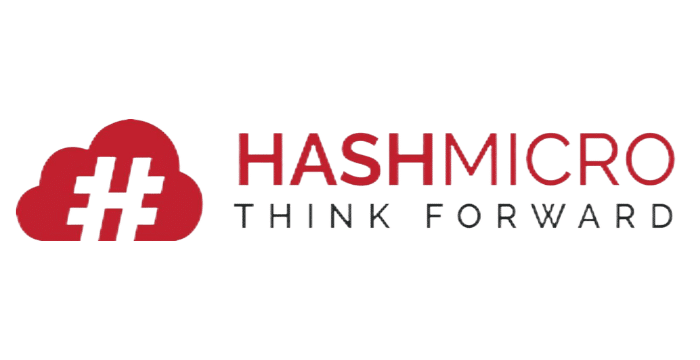
Hash Manufacturing Software for garment manufacturing companies is built to enhance operational efficiency and optimize processes from production to distribution.
With the integration of IoT (Internet of Things) technology, these systems enable real-time data collection and monitoring of critical parameters such as inventory levels, machine performance, and production status.
It also helps to minimize downtime and make data-driven decisions for better resource allocation. This software also offers unlimited user access, allowing garment companies to provide system access to all relevant employees without any additional user licensing fees.
This scalability ensures the ERP system can accommodate the company’s growth and evolving needs. Moreover, HashMicro offers a free demo of its ERP software, allowing businesses to explore its features and capabilities firsthand.
In ERP deployment, scalability is essential as it allows the system to adapt to business expansions or process changes without major overhauls, improving efficiency and reducing costs. Real-time data access enhances communication across departments and supports accurate decision-making.
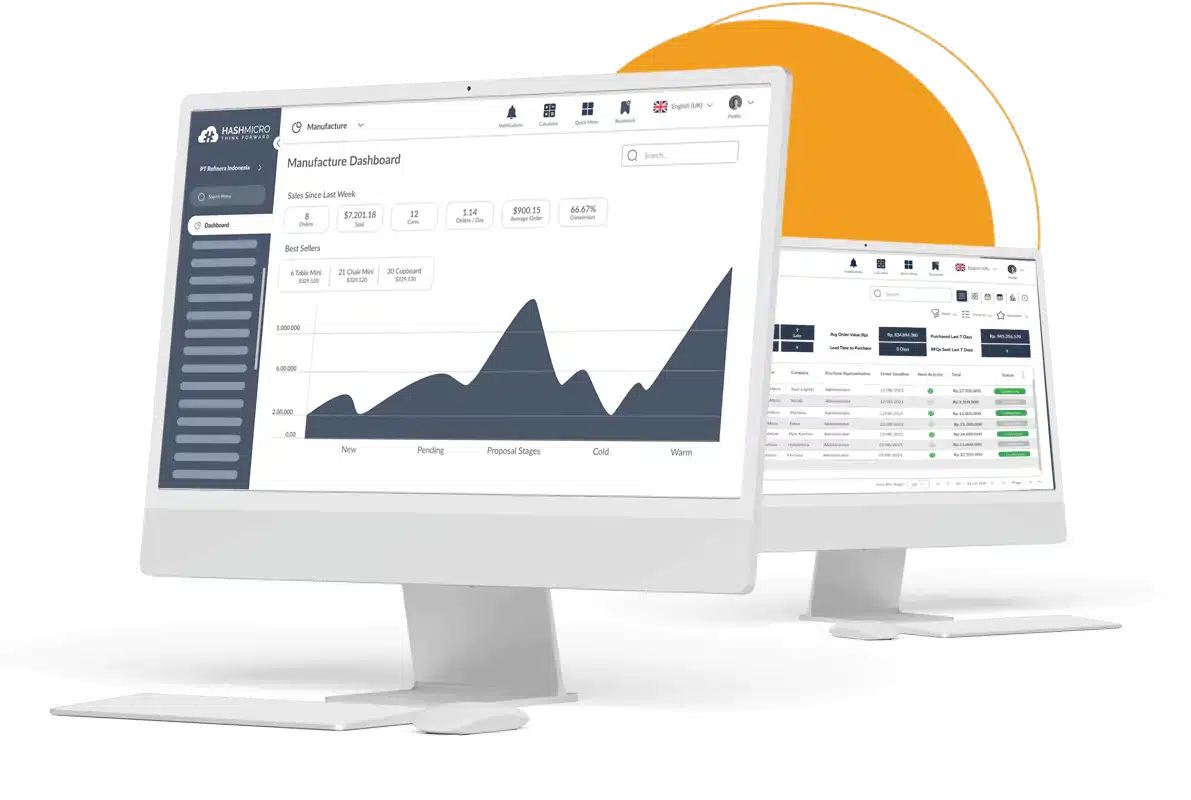
Furthermore, the HashMicro ERP system offers a comprehensive suite of modules specifically designed to cater to the specific requirements of garment companies.
These modules encompass critical areas such as human resources, inventory, accounting, customer relationships, and warehouse management. By integrating the HashMicro ERP system into their operations, garment companies can unlock the potential to custom their very own dashboard.
HashMicro’s ERP software for garment manufacturing companies also brings numerous other benefits, including bank integration for streamlined financial operations, professional assistance for user support, and free demos for informed decision-making.
Key features of HashMicro ERP:
- Financial and accounting management: Provides tools for managing general ledger, and accounts payable/receivable to ensure accurate financial records.
- Inventory and procurement management: Enables efficient tracking of inventory levels, s, and supplier management to optimize stock control.
- Sales and customer relationship management (CRM): Manages sales pipelines, customer interactions, and marketing campaigns to boost sales performance.
- Human resources and payroll management: Handles employee records, payroll processing, and performance evaluation HR operations.
- Manufacturing and production management: Supports production planning, scheduling, and quality control to enhance manufacturing processes.
| Pros | Cons |
|
|
With the benefits of HashMicro’s ERP, garment companies can optimize their operations, improve productivity, enhance financial management, and achieve sustainable growth in a competitive industry.
Hashy AI Fact

Need to Know
Hashy AI enhances garment manufacturing by automating inventory management, order processing, and production planning. This improves operational efficiency and minimizes the risk of human error.
Request a free demo today!
Hashy AI enhances garment manufacturing by automating tasks like inventory tracking, order monitoring, and production planning. Integrated with HashMicro’s ERP system, it helps reduce errors and improve efficiency across operations. Discover smarter manufacturing with AI-driven insights and automation.
Oracle NetSuite
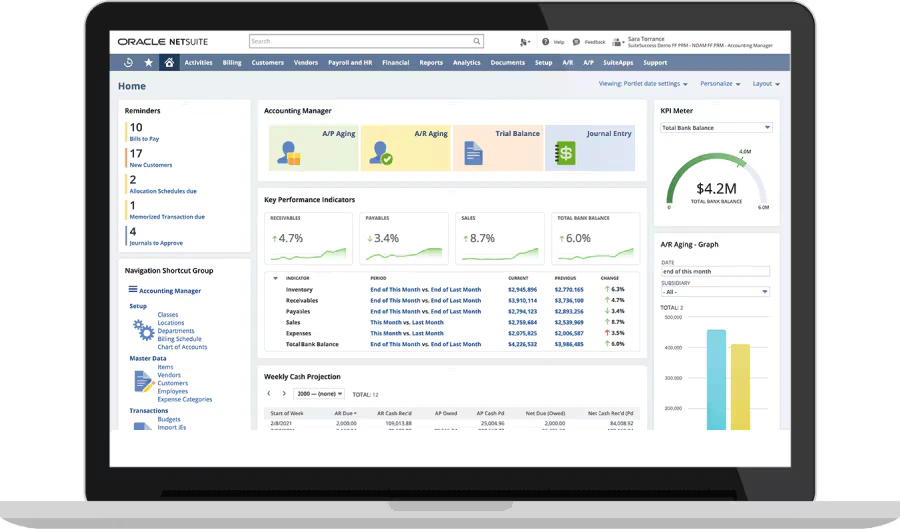
NetSuite is a cloud-based ERP system designed for garment companies, covering supply chain management, inventory tracking, sales, order management, financials, and CRM. It offers real-time visibility into key data, streamlines operations, and fosters efficient collaboration across departments.
Key features of Oracle Netsuite ERP:
- Advanced financial management tools with global compliance.
- Customer relationship management tools.
- B2C and B2B e-commerce solutions.
- Real-time visibility across business operations.
| Pros | Cons |
|
|
Microsoft Dynamics 365
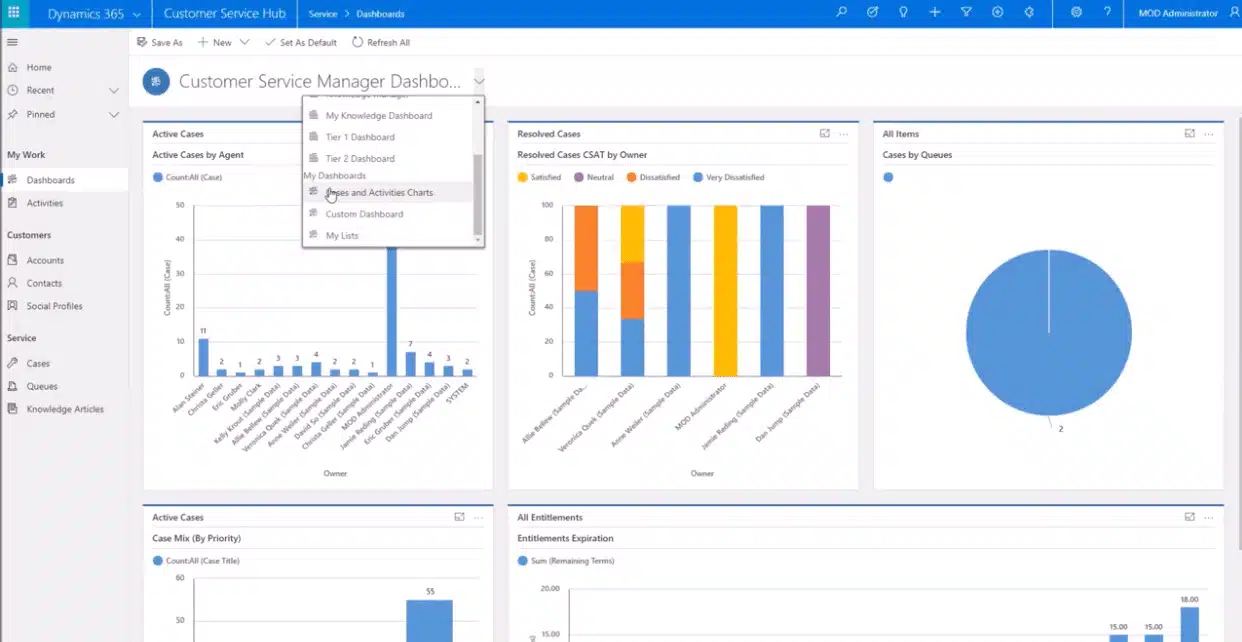
Dynamics is a suite of ERP systems offered by Microsoft, specifically designed to meet the needs of different industries, including garment manufacturing.
Dynamics ERP solutions provide functionalities for managing supply chain operations, production planning, inventory control, sales and distribution, financial management, and human resources.
With its user-friendly interface and deep integration with other Microsoft products, Dynamics enables garment companies to optimize processes.
Key features of Microsoft Dynamics 365:
- Tools to increase sales and personalize service experiences.
- Analytics to understand and predict customer needs.
- Solutions to modernize ERP and deliver supply chain agility.
- Strengthen financial and operating models.
- Tools to deliver supply chain agility.
| Pros | Cons |
|
|
Logic ERP
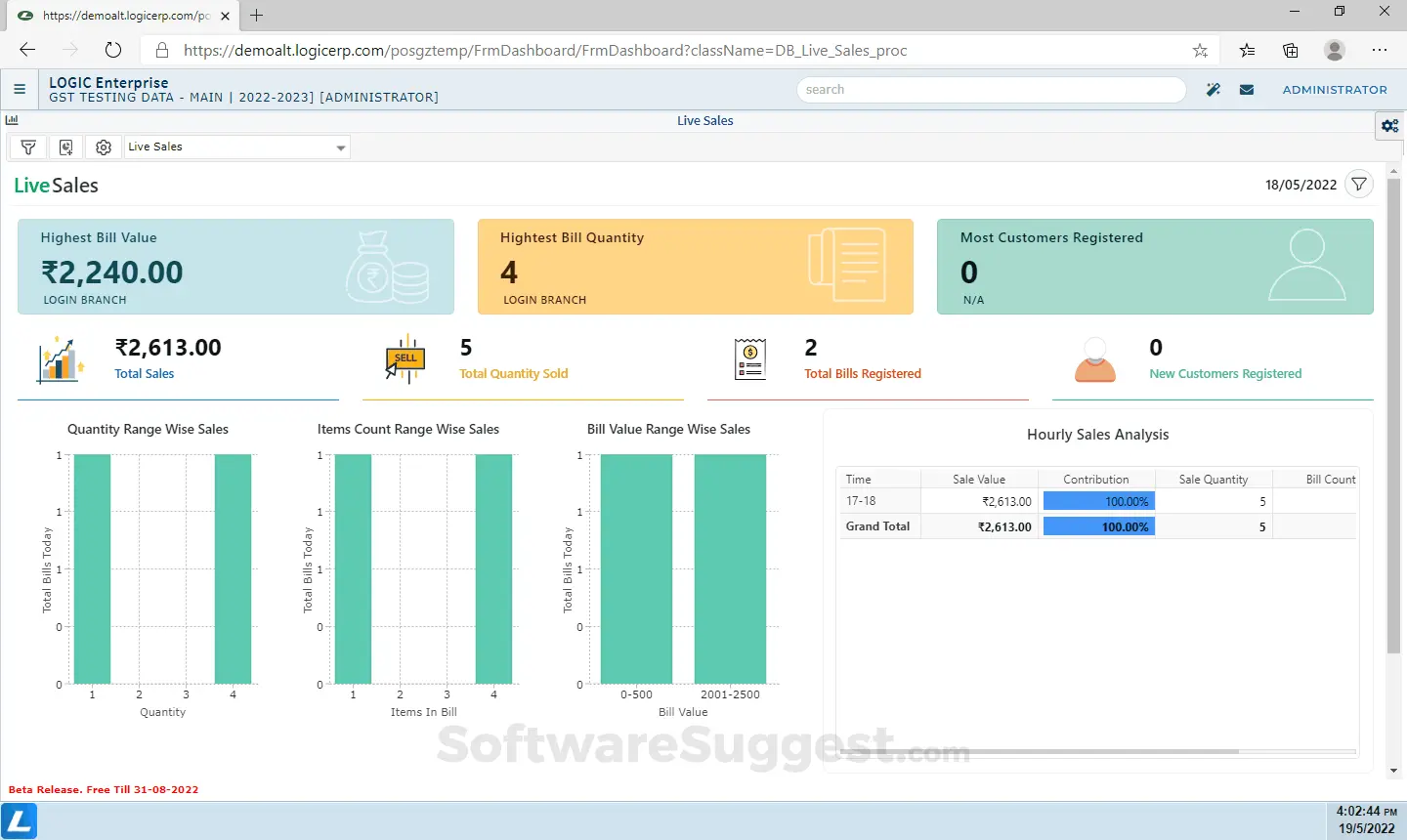
The Logic ERP is an ERP system that caters to the unique requirements of the garment industry. It encompasses modules for managing order processing, production planning, inventory control, quality control, financial accounting, and retail operations.
Then, Logic ERP provides garment companies with end-to-end visibility and control over their operations.
Key features of LOGIC ERP:
- Tailored retail solution for apparel, footwear, FMCG, pharma, and more.
- Tools for efficient distribution processes.
- Comprehensive solutions for manufacturing industries.
- Flexible and configurable billing software.
- Comprehensive solution to manage and track inventory
| Pros | Cons |
|
|
TrueERP
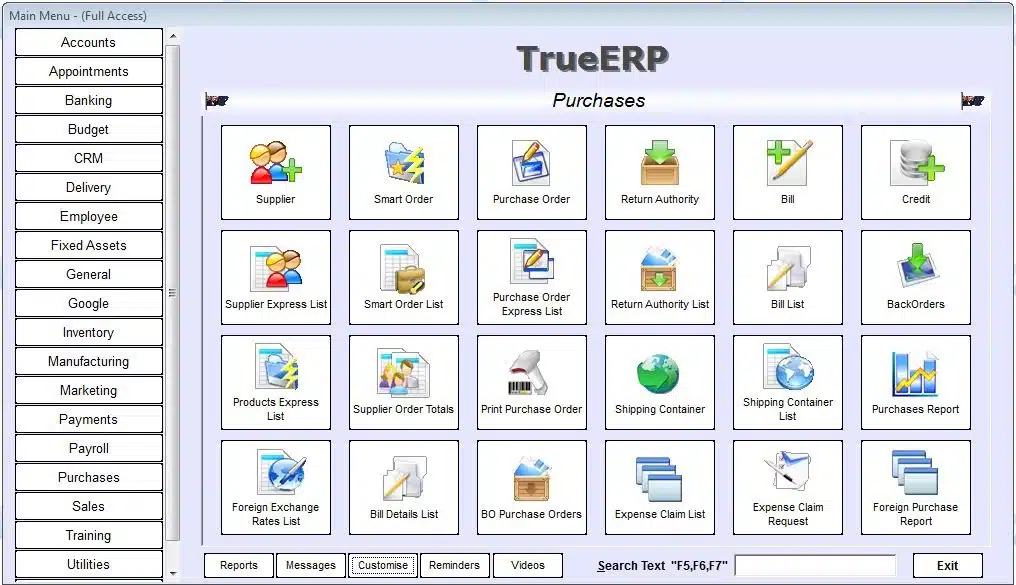
TrueERP is an ERP solution designed to address the diverse needs of garment manufacturers and distributors. It covers key areas such as supply chain management, inventory control, production planning, finance, sales, and customer relationship management.
TrueERP also offers customizable reporting and analytics capabilities, allowing garment companies to gain valuable insights for better decision-making.
Key features of TrueERP:
- Comprehensive financial management, including budgets and job costing.
- Real-time tracking and control of inventory across multiple locations.
- Process and inventory control from input to shipping.
- CRM to maintain customer and prospect relationships.
- Flexible POS systems adaptable to various business needs.
| Pros | Cons |
|
|
How to Choose the Right ERP Software for the Apparel Industry
Selecting the right ERP software is critical to maximizing its benefits. Here’s a guide to help you choose the best solution for your business:
- Understand your needs:
Assess your company’s specific challenges and objectives, such as inventory optimization, production efficiency, or supply chain visibility. Look for software tailored to the apparel industry, addressing these unique needs. - Check features and functionality:
Prioritize ERP solutions offering essential features like production planning, inventory tracking, order management, and integration with e-commerce platforms. - Ease of use:
Choose software with an intuitive interface to ensure quick adoption by your team and minimize training time. - Scalability and flexibility:
Ensure the ERP system can grow with your business and handle increasing complexity as your operations expand. - Customization and integration:
Opt for ERP software that can be customized to fit your specific processes and integrates seamlessly with your existing systems. - Vendor reputation and support:
Research vendors’ reputations by reading reviews, case studies, and testimonials. Reliable customer support and regular updates are essential for long-term success. - Request a demo:
Before making a commitment, request a free demo to evaluate the software’s capabilities and ensure it aligns with your business needs.
Conclusion
Garment manufacturing companies are an integral part of the global textile and fashion industry, and they operate in a highly competitive market that emphasizes design, quality, and timely delivery.
For that, The adoption of ERP software is crucial to achieving operational excellence, as it provides a centralized platform to manage and control various aspects of the manufacturing process, including planning, procurement, production, and distribution.
One of the best ERP software solutions garment companies can consider adopting is HashMicro ERP software. HashMicro ERP software contains advanced software to help garment companies establish their overall operation.
To ensure its advantages, HashMicro provides a free demo service for companies interested in its software. A special offer of a 70% discount is also available if signing for a CTC Grant.
FAQ about Garment ERP Software
-
What is ERP in garment industry?
A Clothing Manufacturing ERP System eliminates manual, repetitive administrative tasks that burden the garment industry, such as generating invoices.
-
What is the ERP system in garments?
ERP system streamlines time-consuming processes, improving resource distribution and cutting overhead costs. It enhances productivity by providing precise forecasts, better inventory handling, and efficient supply chain management, ultimately reducing waste.
-
What is ERP software for manufacturing?
ERP software helps businesses optimize key operations like finance, HR, manufacturing, supply chain, sales, and procurement by offering a centralized platform for accurate, real-time data.






















































